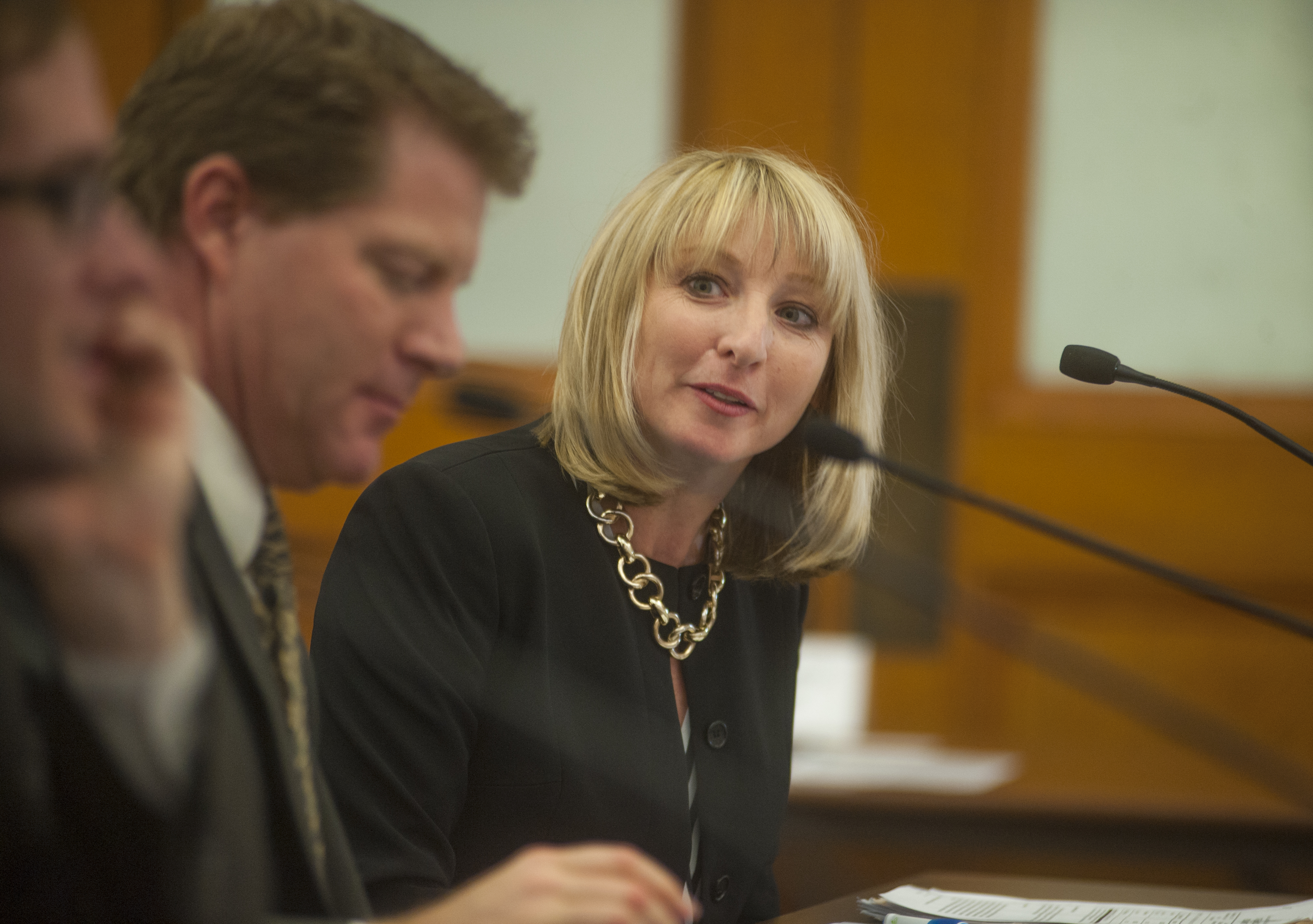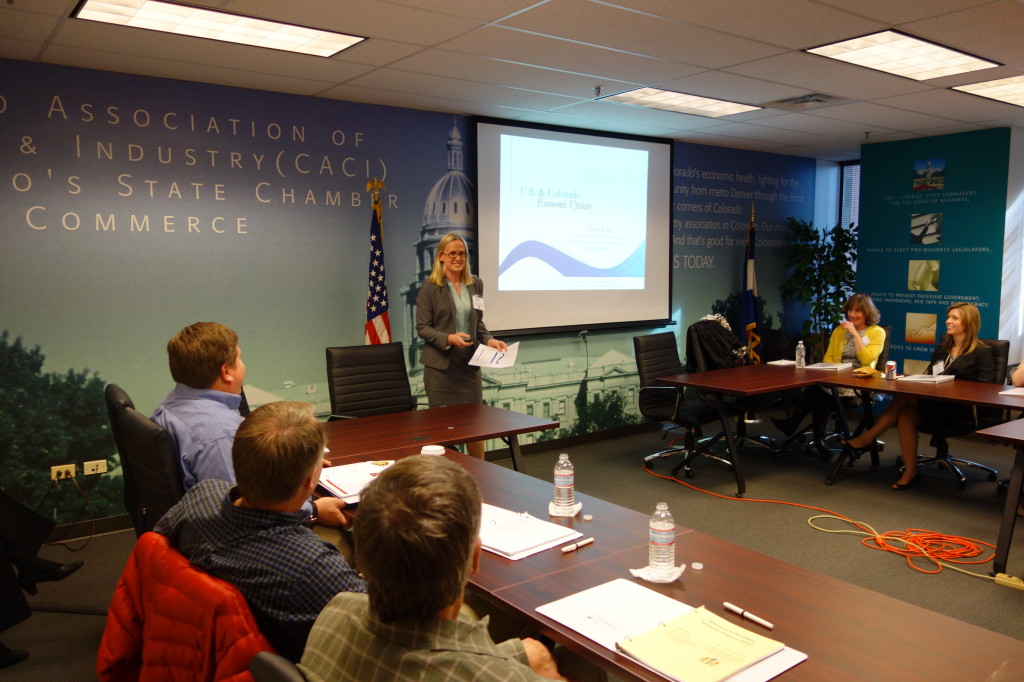In this Capitol Report:
This Capitol Report is brought to you by:
CACI State Policy News
House Committee Gives Unanimous OK to Space-Equipment Tax-Incentive Bill

Loren Furman, CACI Senior Vice President, State and Federal Relations, testified in support of HB-1178 yesterday before the House Finance Committee. To her right is House Minority Leader Brian DelGrosso and House Speaker Mark Ferrandino.
When a legislative committee approves an important bill on a unanimous, bi-partisan basis, it’s noteworthy. And it greatly helps that the majority-party and minority-party leaders of the chamber are the prime sponsors of the measure.
HB-1178, whose title is “Concerning a Sales and Use Tax Exemption for Qualified Property Used in Space Flight,” was approved yesterday morning by the House Finance Committee on a 13-to-0 vote. The next stop for the bill is the House Appropriations Committee.
The House prime co-sponsors are Speaker Mark Ferrandino (D-Denver) and Minority Leader Brian DelGrosso (R-Loveland). Representative DelGrosso also is a member of the Finance Committee.
The proposal creates a sales-and-use tax exemption for “qualified property” used in space flight. The qualified property includes space vehicles and components, equipment to be placed in a space vehicle and fuel for space flight. The bill contains a five-year “sunset” provision.
Speaker Ferrandino told the Committee that the fiscal note to the bill “is very nominal” and that the bill will “help create jobs” and “help grow a growing industry.” He termed the bill “very narrowly worded” effort to try to incentivize the space industry and that the economic impact could be “huge.”
The bill’s fiscal note, issued Monday, says that the State will lose $74,327 in the current fiscal year ending June 30th and $$77,895 in the following fiscal year.
The reason that the fiscal note is so low is because aerospace companies are either building and storing their space flight equipment in other states instead or shipping the equipment out of the Colorado to avoid the State sales-and-use tax.
Minority Leader DelGrosso told the Committee that Colorado needs the measure “to become more competitive” with other states that have already taken this step, such as Florida and California. Local governments in Colorado also can decide whether or not to extend their sales-and-use tax exemption to the space industry, he added.
Among those who testified in support of the bill was Brent Wilson, Tax Director, DigitalGlobe, which is a CACI Aluminum Partner. Here’s an edited version of Brent’s prepared remarks:
Thank you, Madame Chair, and members of the Committee. My name is Brent Wilson and I am here representing DigitalGlobe which is also a member of the Colorado Association of Commerce and Industry.
First, I’d like to thank Speaker Ferrandino and House Minority Leader DelGrosso for carrying this important bill.
As has been explained by the sponsors, this bill creates a sales-and-use tax exemption for “qualified property” used in space flight such as satellites, space vehicles and related components, and equipment to be placed in a space vehicles for ultimate transport and delivery to space.
As a large employer in Colorado and a member of the aerospace industry, we are very excited about this bill because it is this type of legislation that supports our industry and helps Colorado compete with other states that are already considered leaders in the aerospace & defense industry.
Companies like ours which work with other leading aerospace companies to build space flight property have chosen not to store this property in Colorado because the tax environment is cost prohibitive to our business. If we stored the property here longer than 60 days, then we would have to take “title ownership” of the property which would subject us to sales or use tax. Instead we have chosen to take title ownership in other states like California which exempts space property from such taxes. States such as California and Florida already offer economic benefits to aerospace companies that this bill would provide.
So when we store and maintain this property in other states, we are paying out-of-state workers high salaries to do these jobs when we could be hiring Colorado workers. Keep in mind that this is highly advanced technical property that is specifically constructed to exacting standards in order to survive the harsh space environment. The storage of this kind of property requires maintenance by skilled engineers and storage in a clean room and regular maintenance of software, batteries and other equipment to assure there is no degradation to the equipment prior to launch into space. We aren’t talking about simply storing property in a storage shed or facility.
We strongly support this legislation because we are a Colorado company and we want to grow our aerospace industry in Colorado and be a competing state in the nation. Colorado has a significant space presence already with companies like Ball Aerospace, Lockheed Martin, Sierra Nevada, EchoStar and those who are testifying with me today, to name just a few. We believe this type of bill will draw more attention to Colorado from the aerospace industry and have an effect on where aerospace companies and their suppliers decide to locate their operations.
Please note that unlike other types of tangible property that is purchased and used in the state and becomes subject to sales and use tax in the state, space property is not intended to be used in the state but rather will be used or placed in service up in space where it orbits all states and countries of the world. This makes space property unique in that sense.
I would also like to add that the commercial space activities are advancing quickly in the recent years due to the support from NASA to foster commercial activities. Currently there are space ports being built or considered in New Mexico, Texas and several others. As a result many states are adopting similar legislation to what we propose today.
It is our goal to help Colorado compete in this new and challenging economic environment.
Thank you Committee members, and I’m happy to answer any questions.
Christie Lee, Government Relations Analyst for Lockheed Martin Space Systems Company, told the Committee that, although Lockheed Martin does not currently produce and store such space equipment, enactment of HB-1178 would benefit Colorado with potential new economic activity. Lockheed Martin Space Systems Company is a CACI Gold Partner.
Loren Furman, CACI Senior Vice President, State and Federal Relations, told the committee that the Brookings Institution Report pointed out that Colorado needs to become more competitive in commercial aerospace as Federal funding is cut back. Loren noted that concerns about lost revenue to the State if the bill becomes law should be mitigated by such “guardrails” as an annual review by the Colorado Department of Revenue, which the Department shall provide to the House and Senate Finance Committees, and by the five-year “sunset” provision of the bill.
CACI has assembled a coalition of aerospace companies, business organizations and state and local economic development entities to support HB-1178, including the following CACI members:
- Ball Aerospace
- The Boeing Company
- Colorado Springs Regional Business Alliance
- Denver South Economic Development Partnership
- DigitalGlobe, Inc.
- Lockheed Martin Space Systems Company
- Sierra Nevada Corporation
The Colorado Office of Economic Development and International Trade and the Colorado Economic Development Commission are members of the CACI coalition.
For more on HB-1178, read:
“Colorado legislature considers aerospace-related property-tax break,” by Kristen Leigh Painter, The Denver Post, February 14th.
“Colorado spacecraft tax break gets stratospheric support,” by Ed Sealover, The Denver Business Journal, February 13th.
“CACI-Initiated Bill to Grant Tax Incentive to Aerospace Industry Scheduled for Committee,” by Dan Pilcher, The CACI Colorado Capitol Report, February 7th.
“CACI-Initiated Bill to Grant Tax Incentive to Aerospace Industry Introduced,” by Dan Pilcher, The CACI Colorado Capitol Report, January 31st.
For information on the bill, contact Loren Furman, Senior Vice President, State and Federal Governmental Relations, at 303-866-9642.
CACI-Backed Bill to Help Manufacturers Hire and Train Workers Advances
Yesterday, the House Business, Labor, Economic and Workforce Development Committee amended and then approved HB-1013, the “Advanced Industries Workforce Program,” on a 6-5 party-line vote. The bill now heads to the Appropriation Committee.
The House sponsors are Democratic Representatives Pete Lee (Colorado Springs) and Mike Foote (Lafayette).
The legislation will provide funding and resources to help manufacturers hire qualified interns and pay for related training costs. The bill’s fiscal note states that the measure would cost the State about $550,000 in the current fiscal year ending June 30th and $540,000 in the following fiscal year.
CACI member Mark Welle, owner of Wesco Laser Machining and President of the Rocky Mountain Tooling and Machining Association, testified in favor of the proposal on behalf of CACI’s Colorado Manufacturing Initiative.
Other manufacturers and the Colorado Advanced Manufacturing Association (CAMA) also spoke in support of the bill.
For more information on the bill and CACI’s Manufacturing Initiative, contact Dave Tabor, CACI Senior Vice President, Business Partnerships, at 330.866.9650.
The 2014 EXECs Advocacy Program Launches
 The first session of CACI’s EXECs Advocacy Program was held yesterday afternoon at the CACI Office. The 27-member class learned about something its members each through a fun-but-awkward icebreaker.
The first session of CACI’s EXECs Advocacy Program was held yesterday afternoon at the CACI Office. The 27-member class learned about something its members each through a fun-but-awkward icebreaker.
Following the icebreaker the guest speaker, Alison Felix, Assistant Vice President and Denver Branch Executive for the Federal Reserve of Kansas City, spoke on various topics including workforce and unemployment rates and industry growth as well as Colorado’s thriving economy when compared to the national average.
The class is looking forward to its next meeting on March 6th as a part of CACI’s Local Chamber Day at the Colorado State Capitol where it will learn how to be business advocates on bills as well as hear from industry experts in aerospace, manufacturing, and worker’s compensation.
Here’s the class roster:
| Name | Company | Title |
| Amy Robertson | Tri State Generation & Transmission | Colorado Government Relations Advisor |
| Bryan Higgins | Verizon Wireless | Government Sales Manager |
| Cindy Sovine Miller | Sovine Miller | President & CEO |
| Craig Beinecke | Applied Control | Director, PSG Business Unit |
| Dan Sheftel | Brakes Plus, Inc | Legal Counsel |
| Erich Bower | Climax Molybdenum | General Manager of Climax Mines |
| Fritz Ganz | Duffford & Brown | Director |
| Greg Kalkwarf | BKD CPAs & Advisors | Regional Marketing Leader |
| Jenn Penn | Dome Strategies | Owner & Principal |
| Jenny Engle | Fidelity Investment | Senior Director- Public Affairs |
| Jeremy Rietmann | Vail Valley Partnership | Business Development Director |
| Jill Lammers | Vail Valley Partnership | Vice President |
| John Karakoulakis | Holland & Hart | Director of Legislative and Regulatory Affairs |
| Mandy Arellano | CPC Solutions | Chief Operating Officer & Vice President |
| Meaghan Sullivan | Junior Achievement | Vice President of Education |
| Melissa Burkett | Intelligent Software Solutions | Director of Marketing |
| Mike McDonald | Climax Molybdenum | General Manager of Henderson Operations |
| Nate Callister | Wells Fargo | SVP Senior Relationship Manager |
| Nick Kelso | Applied Control | Director, VAPPI Business Unit |
| Richelle McKim | Noble Energy | Engineering Technologist |
| Roy Dillow | Golden Aluminum | Vice President of Finance & Business Development |
| Sara Smith | HealthONE | Senior Vice President Strategy & Development |
| Scott Hutchings | Waste Management | Manager of Public Affairs |
| Steve Kinsley | Kinsley Meetings | President |
| Tandy Dilworth | Xcel Energy | Senior Policy Analyst |
| Tricia Smith | CACI | Vice President Events and Political Fundraising |
| Wave Dreher | AAA Colorado | Director of Communications |
For more information on the EXECs Advocacy Program, contact Lalitha Christian, CACI Business Partnerships Coordinator at 303.866.9635.
News Media Coverage
Below is recent news-media coverage of business, political, policy and governmental issues of interest to CACI:
“Nobler Energy, Anadarko, Encana support tightening Colorado air rules,” by Cathy Proctor, The Denver Business Journal, February 13th.
“CDOT states its case for private partner on U.S. 36,” by Cathy Proctor, The Denver Business Journal, February 12th.
“Common core conflict spikes as Colorado bill aims to rethink standards,” by Kevin Simpson, The Denver Post, February 12th.
“Water wars at the Colorado Legislature: Bill ignites passions,” by Lynn Bartels, The Denver Post, February 12th.
“Audit of Colorado agencies finds need to handle federal money better,” by Joey Bunch, The Denver Post, February 12th.
“Want a tax break in Colorado for not buying health insurance? Think again,” by Ed Sealover, The Denver Business Journal, February 12th.
“DCP Midstream supports tighter Colorado oil and gas rules,” by Cathy Proctor, The Denver Business Journal, February 11th.
“Colorado’s solar power market stalls on jobs front,” by Cathy Proctor, The Denver Business Journal, February 11th.
“Colorado bill on legal reform not what homebuilders hoped for,” by Ed Sealover, The Denver Business Journal, February 10th.
Federal Issues
Administration Releases Cybersecurity Framework
The following was written by Sue McGurkin, CACI Federal Policy Representative, who can be reached at 303.966.9641.
Earlier this week, the Department of Commerce’s National Institute for Standards and Technology (NIST) released its cybersecurity framework that it was directed to complete via President Obama’sexecutive order of a year ago. As reported, the guidance, which is strictly voluntary, “gives critical infrastructure companies a guidebook for ways to prevent and respond to the growing threat of cyberattacks.” In addition, NIST’s press release states that “Organizations can use the framework to determine their current level of cybersecurity, set goals for cybersecurity that are in sync with their business environment, and establish a plan for improving or maintaining their cybersecurity.”
Regarding the impact of the framework and next steps, it was asserted by Paul Tiao, former cybersecurity adviser to FBI Director Robert Mueller, currently a partner at Hunton and Williams’s privacy and data security practice that the administration is still “trying to figure out what incentives they can offer to encourage companies to adopt the framework.”
Tiao goes on to say that “Members of Congress have called for more attention to be focused on the recent high-profile data breaches in the retail sector, including by holding hearings, which “suggests that this set of breaches has had an impact on Congress,” he said. “It is still early, but it’s possible that these breaches that might create momentum for movement on cybersecurity legislation.”
It should be noted that two Members of Colorado’s Congressional delegation, Representatives DeGette and Gardner, sit on the House Energy and Commerce Committee, which has direct purview over many aspects of cybersecurity. In addition, CACI hosted a cybersecurity roundtable late last year for our member companies with Congressman Gardner; and, “it is was agreed upon by all attendees that it is imperative that the private sector continue to play a vital role in shaping our federal cybersecurity policy, particularly since the private sector owns and operates the majority of our nation’s critical infrastructure.”
If you would like assistance in setting up Congressional delegation meetings to discuss your cybersecurity issues directly, please contact Sue McGurkin, CACI’s Federal Policy Representative, at 303.866.9641.
For more information, read:
“White House offers cybersecurity tips,” by Kate Tummarello, The Hill, February 12th.
“OVERNIGHT TECH: Next steps for the cybersecurity framework,” by Julie Hattern and Kate Tummarello, The Hill, February 12th.
“NIST cybersecurity framework: How it will impact healthcare,” by Susan D. Hall, FierceHealthIT,February 13th.


